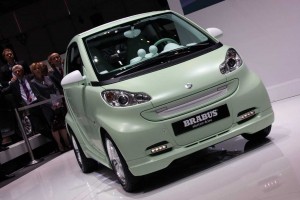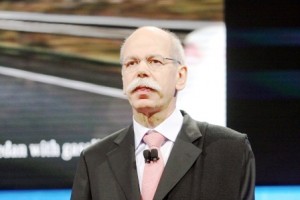
Among the many projects set in motion under the new alliance is the development of a next-generation Smart fortwo, as well as the addition of a 4-door micro-car.
Daimler AG and the Renault-Nissan Alliance have signed a broad agreement on strategic cooperation that they claim will enable the two groups to collectively save nearly $3 billion, over the next five years, while helping all three makers to expand their global presence.
Among initial efforts, the new partners will cooperate on the development of a new product for Daimler’s struggling Smart car brand; they will also work on new gasoline and electric powertrains. And a variety of additional cooperative ventures are under study, confirmed Dieter Zetsche, CEO of Daimler AG and his counterpart, Carlos Ghosn, who serves a dual role as chief executive of both Renault and Nissan.
“The lesson from the last crisis in the auto industry, in 2008 and 2009, is that you better be global, that you cannot do it alone, and that you better have friends,” Ghosn said, during a conversation with U.S. journalists.
As part of the agreement, the two groups will exchange small amounts of equity. This will give the Renault-Nissan Alliance a 3.1% stake in Daimler, while the German makers get a 3.1% stake in both Renault and Nissan.

Even before the new partnership officially gets underway, it has already produced more results than Daimler achieved during its nine-year marriage to Chrysler, sad CEO Dieter Zetsche.
Daimler CEO Zetsche said the agreement was significantly different from Daimler’s failed alliance with Chrysler because it started with very specific projects. The merger with Chrysler had started from exactly the opposite perspective with a broad capital integration but no specific goals.
“After nine years in Detroit we had less on our hand compared to what we have at the start,” of the new alliance, said Zetsche, adding that the cross-ownership underscores that both sides are serious about the alliance.
The Brazilian-born Ghosn emphasized that car makers are facing enormous investment challenges because of the deemand for breakthrough technology to face new C02 and fuel-economy regulations, as well as the need to expand into emerging markets such as China and Brazil.
Ghosn stressed that to be successful, a carmaker can no longer pick and choose which countries to compete in. And, he added, makers can no longer focus on a single segment of the market, but must offer everything from minicars to large luxury SUVs.
“Our skills complement each other very well,” Zetsche added. “Right away, we are strengthening our competitiveness in the small and compact car segment and are reducing our CO2 footprint – both on a long-term basis. We know that we can make brand-typical products based on shared architectures. The individual brand identities will remain unaffected.”
Among the first and most concrete of the plans outlined by the new partners is the development of a new version of the fortwo, currently Smart’s only product. Daimler, Renault and Nissan will also work together to develop a new four-seat vehicle for the smart brand that will provide the underpinnings of the next Renault Twingo.
There is an urgency to this program, as the current smart fortwo is now more than 10 years old and its sales have ebbed as the car has aged. The next smart fortwo is now due in 2013, according to the joint annoucement. One key characteristic of the new products will be the unique rear-wheel-drive architecture used by current smart vehicles, Daimler and Renault said.
The focus of the cooperation in the powertrain area is on the sharing of highly fuel-efficient, diesel and gasoline engines between the Renault-Nissan Alliance and Daimler.
The Renault-Nissan Alliance will provide 3- and 4-cylinder gasoline and diesel engines to Daimler, which will then be adapted and modified to reflect Mercedes characteristics. The result is a win-win situation for both sides: Daimler will be able to utilize Renault-Nissan Alliance engines and capture additional sales potential for Mercedes-Benz’ future lineup of premium compact cars, while the Renault-Nissan Alliance will improve its capacity utilization.
Consumers should benefit, as well. Lower costs could make it possible, Zetsche suggested, to bring products like the Mercedes-Benz A- and B-Class models to the United States.
Daimler, meanwhile, will provide gasoline and diesel engines out of its current portfolio to Nissan’s luxury arm, Infiniti. This includes 4- and 6-cylinder gasoline and diesel engines. Infiniti will be able to expand its offerings with some of the world’s best powertrains, while Daimler will improve its capacity utilization.
And since the Infiniti and Mercedes brands have very little cross-shopping by potential customers, the powertrain swap isn’t likely to result in cannibalization.
The companies have also agreed to cooperate in the light commercial vehicle segment, which product planners now consider a key profit center in the coming years.
Mercedes-Benz Vans will expand its portfolio to offer an all-new entry-level model, intended for commercial usage, starting in 2012. The underpinnings of this van will come from Renault and will be produced at the Renault plant in Maubeuge, France. Both partners will benefit from higher unit sales, better capacity utilization, and shared investment burden, resulting in a better overall cost basis.
In addition to cooperating on small commercial vehicles, selected powertrain components will also be shared to enlarge midsize van offerings. This includes a small diesel engine and transmissions which Daimler will procure from Renault-Nissan for its mid-size van, the Mercedes-Benz Vito.
The projected savings from the new partnership will be evenly split between Daimler and Renault-Nissan, said Ghosn, who added that the payoff from the alliance likely won’t be seen until the third year of the five-year plan.
But he also noted there are “potentially…more” opportunities to cooperate going forward. Zetsche agreed, suggesting that there might even be room to share manufacturing facilities in the U.S.
The key, the German executive said, is that there is already a sense of “trust (which is) producing very real results, already.”
